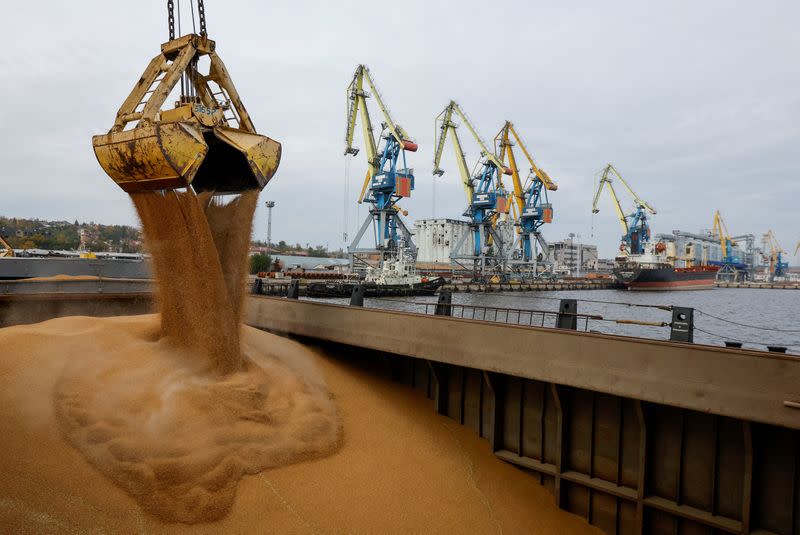Ukraine could fail to meet future wheat demand if attacks continue, UN agency warns
By Michelle Nichols
UNITED NATIONS (Reuters) - The United Nations World Food Programme (WFP) warned on Tuesday that Ukraine's wheat production may be unable to meet domestic and export demand in the years to come if Black Sea export routes remain blocked and attacks on food infrastructure continue.
WFP's Ukraine director, Matthew Hollingworth, said a forthcoming report by the U.N. Human Rights Office (OHCHR) would show that since mid-July there have been 31 documented attacks on Ukraine's grain production and export facilities.
He told the U.N. Security Council that "28 of these attacks were in Odesa oblast alone, which is home of the vital Black Sea and Danube River terminals essential for global trade."
"If attacks on food infrastructure and the blockage of sea export routes continue, it will dramatically impact the agricultural production outlook over years to come, and may, in a worst-case scenario, lead to wheat production being unable to meet domestic and export demand," Hollingworth said.
Russia's U.N. Ambassador Vassily Nebenzia told the Security Council on Tuesday that Moscow targets military infrastructure, not civilian infrastructure.
The United Nations has blamed Russia's February 2022 invasion of Ukraine for worsening a global food crisis. Ukraine and Russia are both major grain exporters. Russia also is a big supplier of fertilizer to the world.
Russia's agriculture minister said last week that Moscow had begun free grain shipments totaling up to 200,000 tonnes to six African states, as promised by President Vladimir Putin in July.
Hollingworth said that before the war Ukraine made up 9% of global wheat exports, 15% of maize and 44% of sunflower oil.
U.N. officials are trying to revive the Black Sea grain deal, which Russia quit in July - a year after it was brokered by the United Nations and Turkey - complaining that its own food and fertilizer exports faced obstacles and that not enough Ukrainian grain was going to countries in need.
U.N. Secretary-General Antonio Guterres told Reuters earlier this month that it will be difficult to revive the Black Sea deal, under which nearly 33 million metric tons of Ukraine grain were exported.
Ukraine launched what it calls a temporary export corridor in August to allow agricultural exports as an alternative arrangement. More than 700,000 metric tons of grain have left Ukrainian ports via the new route.
(Reporting by Michelle Nichols; Editing by Bill Berkrot)

 Yahoo News
Yahoo News 

